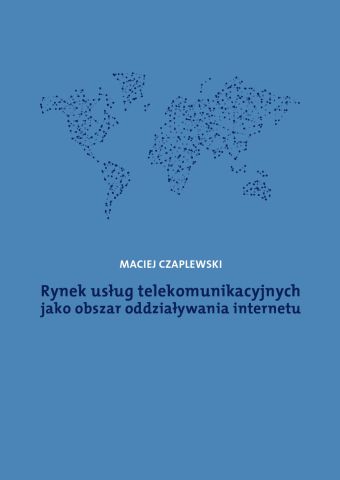
ISBN: 978-83-7972-252-5
ISBN (online): 978-83-7972-768-1
ISSN: 0860-2751
OAI
DOI: 10.18276/978-83-7972-768-1


Lista wydań / T. (MCXXVI) 1052
| Rok wydania: | 2019 |
| Dziedzina: | Dziedzina nauk społecznych |
| Dyscyplina: | nauki o komunikacji społecznej i mediach |
| Autorzy: |
Maciej
Czaplewski

Uniwersytet Szczeciński |
Informacje
Data udostępnienia wersji cyfrowej na licencji CC-BY-SA: maj 2024
Plik numeru
Abstrakt
The telecommunication services market (TSM) specialises in providing information and communication services. For a very long time, networks operated enable to provide traditional information transmission, including voice and text messages. Telecommunication networks developed by the supply-side TSM operators undergo continuous improvements, which primarily follow technological advances in information and communication and the TSM liberalisation and deregulation. In the recent period, we have observed yet another wave of advancement in ICT technologies and the way ICT services are provided due to the expansion and development of the Internet. In this particular context, the fundamental goal of the publication is to present relations between the Internet, as an innovative information and communication technology, and the TSM, as well as to examine and present the following: –– existing TSM transformation under the influence of the Internet, and –– prospective transformation of the market due to the development of the Internet and its socio-economic consequences. As an important goal, the publication attempts to formulate conclusions which can be useful for the development of the economic policy focusing on telecommunication services influenced by the Internet. On the one hand, while examining and presenting current and future TSM transformation due to the development of the Internet and its socio-economic consequences, the paper examines domestic and foreign scientific literature. Based on the above, the publication presents the TSM offer, changes of the supply-side structure of the market and arguments for the perception of the TSM through its attributes, functions and structures. The dissertation also presents conditions of TSM transformation from monopolistic structures to competitive ones while highlighting three groups of issues, such as technical advancement, economic and organisational changes and improvements of the regulatory framework. Additionally, it discusses the impact of technical and economic factors on TSM competition with the use of the Porter’s Five Forces Framework. Following the literature on the subject, the publication lists functionalities of the Internet which offers ample opportunities for sourcing information and communication. The dissertation specifies factors which determine the development of the technology and describes the process of gradual convergence of telecommunication markets and IT and cable television markets, a process which promotes the establishing of the information and communication market. On the other hand, the publication uses information collected and analyses empirical data from seven EU member states which joined the EU in different periods (Germany, Great Britain, Spain, Portugal, Czech Republic, Poland and Slovakia) as well as three non-European countries considered to be the leaders in the development of the Internet and broadband telecommunication networks (Japan, South Korea and USA). To the extent possible, the comparison focuses on data of 2005, 2010 and 2015. The empirical data analysis concentrates on changes in telecommunication networks and services provided, market behaviour of telecommunication operators, consumers of information and communication services and behaviour of regulatory bodies. The author presents his conclusions and proposes solutions for the TSM economic policy and the growing Information and Communication Market. According to the author, information, conclusions and proposed solutions included in the paper can be used for further research on the TSM, including the examination of changes influenced by the Internet as regards the behaviour of telecommunication operators and consumers of information and communication services and regulation of the market. Information presented indicates that the development of the Internet has influenced changes in information and communication networks, structure of network-based services, behaviour of telecommunication operators, users of information and communication services and TSM regulators. Changes of the TSM stimulated by the development of the Internet expedite convergence in information and communication networks, information and communication services and equipment operated by end users. The convergence determines further transformation of the TSM and its gradual shift towards an integrated information and communication market.